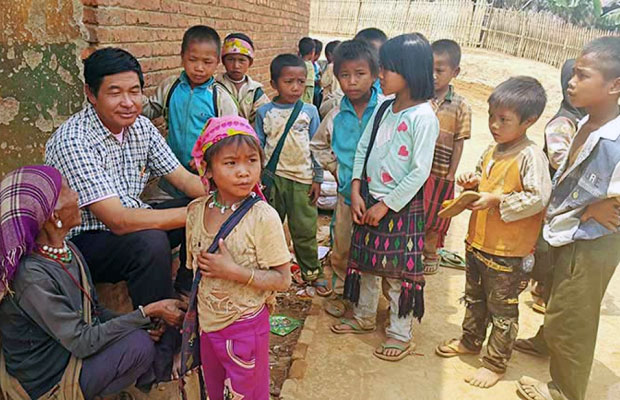
Sparking Children’s Curiosity in Myanmar
It sounds like something out of a movie: a young missionary, serving amid an isolated rural tribe, saving a newborn’s life and forever ingratiating himself to the people. Yet this is exactly what Father Charles Sau Thi Han Lwing did more than a decade ago. This single act — a true manifestation of God’s unconditional love and mercy — promises to rescue the futures of countless more children in the northeast region of Pang Wai, Myanmar.
Thanks to tribal beliefs and customs, that infant — born to a mother who tragically did not survive the delivery — risked immediate execution as a way to “cleanse the family of evil spirits.” Fr. Charles, who had been ministering to the woman in her final hours, begged village elders for permission to take the child far away. Convinced of his good intentions, the elders agreed. Today, having experienced no ill effects from sparing the child’s life, they implicitly trust Fr. Charles and his fellow Salesian missionaries.
It is difficult to underestimate the importance of that trust, especially in the context of Myanmar’s future.
The second largest country in Southeast Asia, Myanmar is a nation wealthy in natural resources — oil, gas and precious gemstones — yet it remains one of the least developed countries in the world. A historically oppressive centralized government has controlled the revenue from these natural resources, depriving millions of Myanmar’s citizens of a secure economic future. In rural areas, especially — where a staggering 70 percent of the population lives in profound poverty — the results of this deprivation are acute: infant and child mortality is among the highest in the region; access to health care, clean water and basic electricity is scarce; and fewer than 50 percent of children successfully complete their primary education.
In Pang Wai, an area dotted with ruby mines, daily life is even bleaker. The global demand for these precious minerals means that private mining companies regularly violate the land and human rights of tribal communities. Animal hunting, which is the tribes’ primary means of sustenance, also causes repeated, and often brutal, conflicts.
“Violence is so endemic to Pang Wai that lasting peace seems almost impossible,” explains Father Mark Hyde, director of Salesian Missions. “But when the local bishop invited our missionaries to help turn the tide, we could not say ‘no.’”
“We know that education is one of the most crucial factors in determining whether or not a child can escape the chains of poverty, whether or not a community can escape the chains of violence, and whether or not human beings recognize and protect each other’s common dignity,” Fr. Mark continues. “For this reason, educating Pang Wai’s children — something they’ve never before had access to, because the tribes haven’t valued it — is among our first priorities.”
Thanks to the groundwork first established by Fr. Charles, tribal leaders welcome the effort.
With assistance from many kind benefactors, missionaries will soon begin restoring several dilapidated buildings, previously used to house livestock, into safe, durable primary schools in four area villages. Once built, the schools will educate girls and boys through the age of 12, with an initial focus on basic literacy. Through play and other interactive programs, children will also begin to learn about respect, human dignity and kindness — principles that are crucial to their own success, and a more peaceful future for their country.
“It’s a modest first step,” says Fr. Mark, “but one that will help spark children’s curiosity and, in turn, illuminate the path toward a better future.”
Our mission gives hope to those living in impoverished communities by offering opportunities to build a brighter future. What’s your mission?

